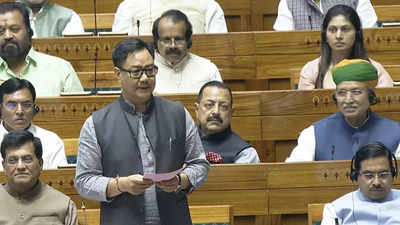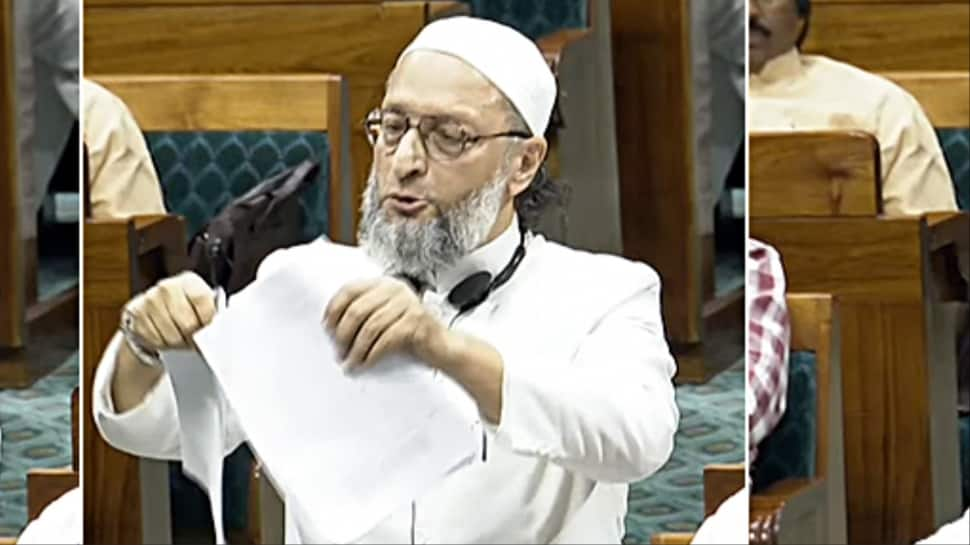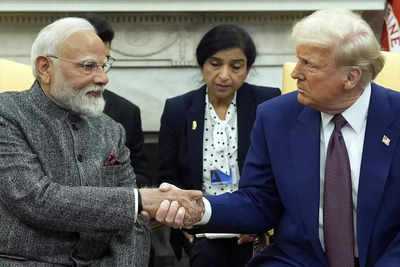
Waqf Amendment Bill tabled in Lok Sabha amid opposition: Key points NEW DELHI: The BJP-led central government tabled the Waqf (Amendment) Bill in Parliament on Wednesday amid opposition from INDIA bloc . The bill incorporates suggestions made by the Joint Parliamentary Committee that examined it. The House also took up the Mussalman Wakf (Repeal) Bill, 2024, for consideration and passing.
Amidst a big showdown, Union minister Kiren Rijiju introduced the bill in the Lok Sabha and defended the proposed reforms. He questioned the criticism, saying, "Why are we being challenged when we are introducing positive changes? Those who have no direct involvement in the bill are being misled and provoked." Waqf Amendment Bill 2024 The debate on the bill began with Congress leader KC Venugopal, who opposed the bill, saying that the Centre was "bulldozing the legislation".

"This type of bill ( Waqf Amendment Bill ) that you are bringing into the House, at least the members has to have the power to give amendments...
You are bulldozing the legislation. This is this type of legislation. You need to give time for amendment.
There are several provisions to be given amendment. There is no time at all..
," he said. To this, Union minister and senior BJP leader Amit Shah dismissed the opposition to the bill, saying, "..
.It was your (opposition) insistence that a Joint Parliamentary Committee should be formed. We do not have a committee like the Congress.
We have a democratic committee, which brainstorms," he said. "'Congress ke zamane mein committee hoti thi jo thappa lagati thi'. Our committee discusses, deliberates on the basis of discussions and makes changes.
If the changes are not to be accepted, then what is the point of the committee?" he added. Meanwhile, Speaker Om Birla assured that amendments from both government and opposition received balanced consideration from him. When RSP representative NK Premachandran raised procedural concerns, Home minister Amit Shah clarified that the union cabinet had approved the amendments within the bill, which stemmed from the JPC report.
He concluded, "There is no point of order." The proceedings continued with staunch reply from Rijiju to opposition. He highlighted that the JPC's consultation process was the largest ever exercise carried out by a parliamentary panel in India's democratic history.
He reported that the JPC received and reviewed more than 97.27 lakh submissions, including petitions and memorandums, through both physical and online formats before completing their report. The minister noted that 284 delegations presented their perspectives on the bill, alongside Waqf boards from 25 states and Union Territories.
He mentioned that distinguished legal luminaries, charitable organisations, academicians and religious leaders, among others had also contributed their views. "The government is not going to interfere in any religious institution. The changes made in the Waqf law by the UPA government gave it overriding effect over other statutes, hence the new amendments were required," Rijiju said amid noisy opposition protest.
"You tried to mislead the people on issues which are not part of the Waqf Bill," Rijiju told the opposition..















